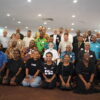
Slavery in NZ must end
NZ Christian Network welcomes the work of TV3 and Stand Against Slavery in exposing unfair practices in NZ that can rightly be categorised as slavery.
Read the media release from Stand Against Slavery …
– FOR IMMEDIATE RELEASE —
EXPLOITATION AND SLAVERY: IS THIS THE REALITY FOR WORKERS IN THE CHRISTCHURCH REBUILD?
AUCKLAND, NEW ZEALAND Last night, TV3’s 3rd Degree’s expose on the exploitation of vulnerable Filipino construction labourers might shock some kiwi’s who believe that exploitation and slavery does not happen in New Zealand. The programme exposed the actions of Tech5, a recruitment firm and Holdings Limited now in liquidation.
Stand Against Slavery defines slavery as when “a person is forced into an activity (including labour), held against his or her will by some method of control for the gain or profit of those who are in control of that individual.”
Tech5 provided substandard accommodation at exorbitant rates ($155 per person per room, with three men to a room), made a verbal arrangement with the men before leaving the Philippines that they would be liable for the cost of their toolbox, but once in New Zealand that cost escalated to $7,700 each (now slightly reduced to $5,600 per person), and repaid at a rate of $125 per person per week for over a year. This cost was stipulated in a replacement contract that was given to the men once they arrived in New Zealand under obligation to sign. These men are vulnerable migrant workers, in a new country, with a visa conditional upon their being connected to Tech5. Tech5 was in a position of power and abused the specific vulnerability of their workers. In addition, they created a debt bondage within the contract in stipulating that if those workers left their employment before the end of the contract, they would be liable for just over $10,000 US Dollars. Tech5 Wellington Director, John Wyatt described it as “protecting their investment”. Stand Against Slavery would describe it as a coercive tactic employed by Tech5 management to control their workers and ensure that they stay working with Tech5. It is the type of tactic that would be criminalised under the new measures in the Immigration Amendment Act (No 2) Bill. Such measures are typical in bonded servitude and the reality of enslavement for many workers around the world, and now, in New Zealand today.
With Holdings Limited folding, their workers are now left without legal immigration status and must wait until Immigration New Zealand fix their visa. At the recent Prevent People Trafficking Conference in Wellington during June 2014, an Immigration Official mentioned that a new policy regarding an open visa for vulnerable workers such as the Holdings Limited workers, is still being “discussed”. Therefore, the fate of these workers is unclear. If Immigration NZ determines that they cannot provide another work visa for the workers, and they are repatriated home, the workers fate will be bitter-sweet. They will see their families but they will have at least $4,000 owing to local debt collectors, and wages in the Philippines are much lower than New Zealand, as such, their ability to repay those loans will be severely impaired. Therefore, the Directors of Holdings Limited get off scott-free while these workers will pay the cost for years to come.
Stand Against Slavery believes that the government should be moving on policies to ensure that migrant workers are protected. We agree with Paul Brown, lawyer for some of the Tech5 employees, that every person in New Zealand who is legally able to work, should have access to basic standards of employment law. We also believe that the open-visa policy for exploited migrants should be addressed urgently and incorporated into the Immigration Amendment Act (No 2) Bill.
Stand Against Slavery is an organisation that is determined to increase the consciousness and active participation of the New Zealand public about the global injustice of human slavery and the trading of slaves in every country in the world, including New Zealand.
–ENDS—
For more information, please contact Steph Lambert, Head of Advocacy and Capacity Building





